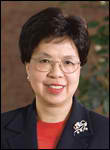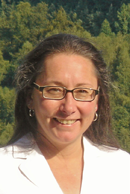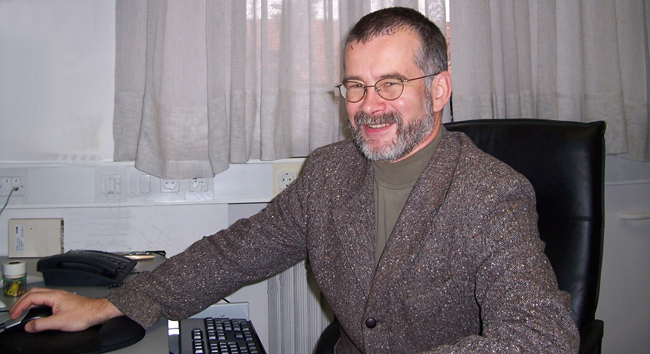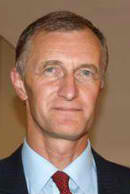Unveiling the speakers for WONCA Prague
The speakers for WONCA Prague 2013
Dr Margaret Chan: World Health Organization (WHO) Director-General
Prof Michael Kidd: WONCA President Elect
Prof Amanda Howe: Honorary Secretary Royal College of General Practitioners (RCGP)
Dr Karen Kinder: Executive Director of ACG International
Prof Igor Švab: Immediate Past President of WONCA Europe region
Prof Jan Škrha: Vice-rector Charles University, Prague - the local expert
Dr Margaret Chan
 Dr Margaret Chan, Director-General of the WHO, will give a lecture entitled "Family doctors in an era of inequality: from unsung heroes to rising stars“.
Dr Margaret Chan, Director-General of the WHO, will give a lecture entitled "Family doctors in an era of inequality: from unsung heroes to rising stars“.
Dr Margaret Chan, from the People's Republic of China, obtained her medical degree from the University of Western Ontario in Canada. She joined the Hong Kong Department of Health in 1978, where her career in public health began.
In 1994, Dr Chan was appointed Director of Health of Hong Kong. In her nine-year tenure as director, she launched new services to prevent the spread of disease and promote better health. She also introduced new initiatives to improve communicable disease surveillance and response, enhance training for public health professionals, and establish better local and international collaboration. She effectively managed outbreaks of avian influenza and of severe acute respiratory syndrome (SARS).
In 2003, Dr Chan joined WHO as Director of the Department for Protection of the Human Environment. In June 2005, she was appointed Director, Communicable Diseases Surveillance and Response as well as Representative of the Director-General for Pandemic Influenza. In September 2005, she was named Assistant Director-General for Communicable Diseases.
Dr Chan was elected to the post of Director-General on 9 November 2006. The Assembly appointed Dr Chan for a second five-year term at its sixty-fifth session in May 2012. Dr Chan's new term will begin on 1 July 2012 and continue until 30 June 2017.
Professor Michael Kidd
 Professor Michael Kidd is the President-elect of the World Organization of Family Doctors (WONCA) and will take over as World President in Prague. He will speak in prague on "Family Medicine and WONCA: the challenges ahead"
Professor Michael Kidd is the President-elect of the World Organization of Family Doctors (WONCA) and will take over as World President in Prague. He will speak in prague on "Family Medicine and WONCA: the challenges ahead"
Michael has been a member of the WONCA executive since 2004. He was an elected Member-at-Large of WONCA from 2004-2010 and served as Honorary Treasurer from 2007-2010. He was the WONCA liaison person with the World Health Organization from 2005-2010 and convened the WONCA Education Working Party from 2006-2010. He was a member of the WONCA Asia Pacific Regional Council from 2004-2007. He was the inaugural convenor of the WONCA Informatics Working Party from 1995-2007.
He is now the Executive Dean of the Faculty of Health Sciences (including the Schools of Medicine and Nursing and Midwifery) at Flinders University based in Adelaide and with clinical schools and research centres in South Australia, the Northern Territory and Western Victoria. He also works part-time as a general practitioner in South Australia and the Northern Territory with special interests in the care of people with HIV and Indigenous Health.
Michael’s research and education interests including primary health care and general practice, e-health, health policy, medical education, safety and quality in primary care, and the primary care management of HIV, hepatitis C and sexually transmissible infections.
For more about Prof Michael Kidd
Professor Amanda Howe
 Professor Amanda Howe MD FRCGP FAcadMEd was elected Honorary Secretary of teh Royal College of General Practitioners, in 2009. She practises at the Bowthorpe Medical Centre in Norwich, England and has been Professor of Primary Care at the University of East Anglia since 2001. “I wanted to be a GP when I was a medical student, despite influences from tutors to do otherwise”, says Professor Howe. “I’m fascinated by the role that the GP consultation can play in helping patients make sense of their lives, and overcome physical and mental adversity.”
Professor Amanda Howe MD FRCGP FAcadMEd was elected Honorary Secretary of teh Royal College of General Practitioners, in 2009. She practises at the Bowthorpe Medical Centre in Norwich, England and has been Professor of Primary Care at the University of East Anglia since 2001. “I wanted to be a GP when I was a medical student, despite influences from tutors to do otherwise”, says Professor Howe. “I’m fascinated by the role that the GP consultation can play in helping patients make sense of their lives, and overcome physical and mental adversity.”
Amanda has been deeply involved with WONCA since 2000, when she facilitated a workshop for their Working Party on Women and Family Medicine. She is on their Executive, chaired the group from 2007-2009, and hosted an international meeting at UEA in 2009. She now serves on the newly created Equity Committee, is a member of WONCA Europe’s Bylaws Committee, and (also as part of her role as RCGP Honorary Secretary), often attends WONCA conferences in Europe and around the world to contribute relevant papers and promote the development of family medicine.
For more about Prof Amanda Howe
Doctors’ health and wellbeing
This talk, given by Prof Amanda Howe, will examine
the facts of doctors’ illhealth; look at the systems factors which
contribute; and look in detail at what a sound preventive strategy might
look like.
Family medicine is both rewarding and challenging. Family medicine practitioners are some of the best doctors in the world, working heroic hours and spreading their skills across the needs of all patients, young and old – often also being teachers, researchers, and leaders of their communities and health services.
Our own health and wellbeing is crucial to dealing with the demands of our professional lives, but we know that doctors allow themselves to override boundaries which we would recommend to our patients – whether alcohol, sleep deprivation, or working when unwell. The statistics for doctors’ health problems are very worrying – yet some doctors seem able to be highly resilient, and to be better at self care and stress management, while others underperform, go off sick, and are lost to the service which has invested in their training.
Prof Howe is inviting contributions from WONCA members via the new WONCA website (you need to join the WONCA forum to add your story www.globalfamilydoctor.com/register). So please consider adding to the theme – Amanda is encouraging member engagement in everything she does!
Professor Amanda Howe
[email protected]
Dr Karen Kinder
 Dr Karen Kinder PhD MBA, is an associate faculty member of the Health Policy and Management Department at Johns Hopkins University, Bloomberg School of Public Health where she received her doctorate. Through both educational and professional experience, Dr Kinder has accumulated in-depth knowledge of health care systems worldwide.
Dr Karen Kinder PhD MBA, is an associate faculty member of the Health Policy and Management Department at Johns Hopkins University, Bloomberg School of Public Health where she received her doctorate. Through both educational and professional experience, Dr Kinder has accumulated in-depth knowledge of health care systems worldwide.
With an emphasis on promoting the importance of primary health care delivery, Dr. Kinder’s research interests center on how countries can improve the efficiency and effectiveness of their primary health care systems. Specific areas of expertise focus on how health information technology can be applied to improve the delivery of primary care, the impact of the financing system and the organization of the delivery of care on a population’s access to quality health care, the measurement of morbidity within that population and the need for risk adjustment in financial, clinical and managerial decisions as well as the effective coordination of primary and specialty care. She has contributed her expertise to numerous international projects in developed and transitional countries.
In her current capacity as Executive Director of ACG International, Dr. Kinder oversees the application of the Johns Hopkins ACG® System, the most widely used population based case-mix system in the world and supports users in its implementation.
Improving Coordination between Primary and Secondary Health Care through Information
Family Doctors are under pressure due to falling practice incomes, diminishing continuity of care within primary care and a fragmented healthcare environment. Meanwhile populations are ageing with increasingly complex patients with multi-morbidity who could be better cared for within the community.
Dr Kinder’s keynote will address the impact of information, gained through routinely collected data, on improving coordination and continuity of care across the spectrum of the health care system. Dr. Kinder will speak on the existing scientific evidence regarding:
• the differentiation between primary and specialty care, and issues surrounding coordination and continuity,
• the importance of delivering care in the appropriate setting based on patients’ morbidity profile,
• the impact of multi-morbidity on the delivery of care, including the identification of patients at risk of poor coordination.
• strategies to implement more appropriate interfaces between primary and specialty care within their organization.
Prof Igor Švab
 More than thirty years ago I started working as a family doctor in a rural practice. Even if I still practice, my main job now is the one of a professor of family medicine. I enjoy both: to be a family doctor and to be a teacher. I consider myself a lucky man, doing the best job in the world and teaching about it.
More than thirty years ago I started working as a family doctor in a rural practice. Even if I still practice, my main job now is the one of a professor of family medicine. I enjoy both: to be a family doctor and to be a teacher. I consider myself a lucky man, doing the best job in the world and teaching about it.
For more about Prof Igor Švab
Do we dare to be different?
My keynote in Prague is going to address the challenge of family medicine to keep its values and the dilemmas we are facing when we try to maintain them. I hope you will find it interesting.
I will start from the statement that family medicine has already been successful in identifying its principles and characteristics. A lot of time and effort has been put into this exercise, starting from the first Leeuwenhorst group in Europe. Although it is important that the international organisation of family medicine periodically checks whether the definition is still valid, it is much more important to see how the principles are applied in practice.
My thesis is that we as a discipline must be ambitious and brave. This implies that we must often take a different path from other disciplines when we adress the issues of policy, research and education. By doing this we risk that our positions will not always be understood or accepted. But the other option is much worse: when we try to be as similar as possible to other disciplines in order to comply with their ways of thinking, we lose our identity. If we lose this, we are no longer needed as a profession, because we can be replaced by others.
Prof Jan Škrha
 Prof Jan Škrha MD, DSc was born in 1954 in Prague. After graduation at Charles University, Medical Faculty (1979, MD) he has been working at Department of Endocrinology and Metabolism in the field of diabetes mellitus. He published more than 250 articles, participated in about 200 congresses, symposia and meetings and received several awards for scientific work in diabetology. He has been a member in scientific organizations: Czech Diabetes Society (Secretary, President and Vice-chairman), Czech Medical Association (Vice-President), European Association for the Study of Diabetes (Secretary of the Postgraduate Education Subcommittee, Honorary Treasurer), and others. He represents Czech Medical Association in the UEMS where is now as Vice-President. He is Scientific Secretary of the Accreditation Committees for Postgraduate education by Ministry of Health. He is Vice-Rector of Charles University.
Prof Jan Škrha MD, DSc was born in 1954 in Prague. After graduation at Charles University, Medical Faculty (1979, MD) he has been working at Department of Endocrinology and Metabolism in the field of diabetes mellitus. He published more than 250 articles, participated in about 200 congresses, symposia and meetings and received several awards for scientific work in diabetology. He has been a member in scientific organizations: Czech Diabetes Society (Secretary, President and Vice-chairman), Czech Medical Association (Vice-President), European Association for the Study of Diabetes (Secretary of the Postgraduate Education Subcommittee, Honorary Treasurer), and others. He represents Czech Medical Association in the UEMS where is now as Vice-President. He is Scientific Secretary of the Accreditation Committees for Postgraduate education by Ministry of Health. He is Vice-Rector of Charles University.
Diabetes = global pandemic
In this lecture he will focus on present and future problems of diabetes mellitus, especially on early diagnosis, treatment and prevention.